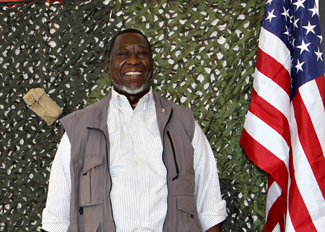Young veterans from Iraq or Afghanistan pursuing degrees from UT Dallas often arrive on campus battle-weary and with markedly different needs than typical college students.
They’ve served back-to-back tours of duty, and they worry about potential redeployment. Short furloughs give them little time to deal with marriage and family issues. And after serving in the military for four or five years straight out of high school, their academic skills may be rusty.

Student Keeshaun Coffey served in the Navy and is president of Veterans of Dallas at UT Dallas.
“Our job is to relieve some of that,” says Ken Saunders, assistant director of the new Veteran Services Center at UT Dallas. “We’re doing everything as a University to make them successful.”
The center, which will be dedicated on Sept. 14, is a one-stop shop of resources for veterans, from financial aid and benefits to academic success programs. Located in the first floor of McDermott Library, it’s just a few steps from the Student Success Center, which helps students overcome academic obstacles in getting a college degree.
The center also provides veterans with a listening ear from someone who’s been there.
“We have a space where they’ll feel at home, and receive care and compassion,” said Saunders, a former drill sergeant who had been in the military from the Vietnam era through Desert Storm.
For seven years, he was a civilian contract worker for the military in Iraq, so he knows the constant preparedness that more recent veterans have had to maintain.
“They’ve had to be so alert. It’s left them very jittery,” Saunders said. “They are readjusting from a war zone back to Earth.”
With a growing number taking advantage of the latest government educational benefits, it makes sense to have a center at UT Dallas dedicated to the needs of veterans, said Dr. Darrelene Rachavong, vice president for Student Affairs.
The Post 9/11 GI Bill gives eligible veterans free in-state, undergraduate education at any public university. Benefits are based on duration of military service. Stipends are also provided for housing and books. Work-study programs help cover living expenses.

Ken Saunders is assistant director of the new Veteran Services Center.
Some 400,000 veterans were enrolled in higher education institutions in spring 2012, according to the Iraq and Afghanistan Veterans of America (IAVA), a New York-based advocacy organization for young veterans.
At UT Dallas, about 625 military veterans and 100 or so dependents are drawing GI benefits, with nearly 350 of them attending under the Post 9/11 GI Bill, Saunders said. Another 300 veterans are pursuing graduate degrees here on their own dime after their benefits ran out.
The new Veteran Service Center is part of the University’s response to encouragement from the Department of Veteran Affairs and the UT System to support veterans under the new bill. UT Dallas had long helped veterans navigate financial and enrollment needs, and provided counseling and career help, Rachavong said. But now it’s time for a center of their own.
“This is centralizing the information for veterans and providing a clearinghouse for resources. Now the needs are there,” Rachavong said.
The center also has a lounge area for vets to hang out between classes and be served by a dedicated staff to answer questions.
Buddy Sherbet, who handles financial aid and GI Bill certification for veterans at UT Dallas, keeps his office door open in the new center. He’s been a fixture in helping veterans line up educational benefits, even while they were still on the field. The new center will give them a place to connect face-to-face, he said.
“About half will come in and ask if we’ve served in the military. It’s important to them,” said Sherbet, who spent 18 months in the Navy after being drafted during the Vietnam War.
“They’ve had to be so alert. It’s left them very jittery. They are readjusting from a war zone back to Earth.”
Ken Saunders,
director of the new
Veteran Services Center
An increasing number of UT Dallas freshmen are recent veterans in their mid-20s. University staff describe these veterans as motivated and highly disciplined as students, but say they also feel alienated and isolated from the general public at times.
“Some may not want to identify themselves as a vet. They may be a nontraditional student. They might be married, or they’re older—with children, and some experience a heightened anxiety because there’s the potential for redeployment,” said Amber Wright, a staff psychologist and veteran services coordinator at UT Dallas.
Besides counseling help, the veterans center can provide information on research initiatives at UT Dallas’ Center for BrainHealth that include protocols for helping those with traumatic brain injury to improve cognitive skills, and the use of magnetic stimulation technology to minimize symptoms of PTSD.
Cary Ziegler, 33, did intelligence work for the Navy in the D.C. area, and says she was diagnosed with PTSD after having depression and flashbacks due to her experiences. Now working on a master’s degree in international political economy at UT Dallas, she said the new Veteran Services Center is a “safe place” for her.
“It’s a paranoia you live with,” she said. “It’s hard to adjust to people who are not in the military. You don’t have that thing in common, that bond. I wanted to hang out with people I feel safe with.
“At the center, I feel safe. I feel I don’t have to watch my back.”
Saunders said staff members strive to use their experiences to support UT Dallas’ veteran students.
“We are advocates for them because we’ve walked in their boots,” Saunders said.